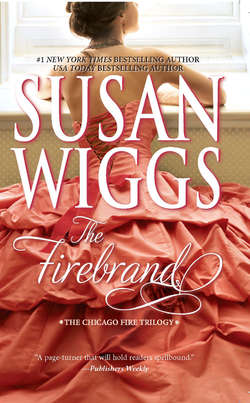Читать книгу The Firebrand - Сьюзен Виггс, Susan Wiggs - Страница 8
Prologue
ОглавлениеChicago
Sunday, 8 October 1871
The city was like a matchstick, waiting to be struck. The shipyards were stacked with lumber from the north woods, soon to be transformed into warehouses, tenements, breweries and shanties. In just a few short years, the prairie town had sprawled into an ungainly maze of wooden structures.
Many of the buildings looked grand. Some even appeared rock-solid. But in fact, most structures were clad in the false and fancy dress of ornate facades. Their insincere faces were painted to resemble stone or marble, copper or tin. But scratch beneath the surface, and the flimsy substance would be revealed—wood, as dry as tinder, capped by a deceptive veil of shingles glued on by flammable tar.
The roadways radiated like arteries from the giant, churning heart of the lake. Six hundred miles of wooden sidewalks and sixty miles of pine-block roadways spread through the business district and working-class neighborhoods where immigrant mothers tried to hush their fretful children, suffering in the unseasonably dry heat. Rickety boardwalks and causeways spread across manufacturing centers and even dared to encroach upon the fashionable wealthy areas north of the river.
The barons of industry and commerce had put up varnish factories, alcohol distilleries, coalyards, lumber mills and gasworks with more regard for fast profit than for fire prevention. They lived for show, in houses built to resemble the centuries-old manors of aristocrats. Blooded coach horses occupied stables crammed with dry straw and timothy hay. Avenues of trees, stripped dry by the summer-long drought, connected neighbor to neighbor, each trying to outdo the other in ostentation. Those who had established themselves in the city a mere fifteen years ago liked to call themselves Old Settlers, and the new arrivals had no grounds to challenge the designation. Instead they set to work earning their own fortunes so that one day they might buy their way into the ranks of the merchant princes.
Many of these newcomers stayed at the Sterling House Hotel, which was considered the very height of fashion. Literally. Crowned by a dome of colored glass, the five-story structure boasted a steam elevator and commanded an impressive view of the river.
Feverish and impatient with ambition, no one cared that Sunday was supposed to be a day of rest and reflection. No one heeded the fire alarms that had been shrieking through drought-choked neighborhoods all week. The wheels of commerce ground on with dogged relentlessness, and only those too timid to dream greatly would pause to worry that Chicago was a city built of tinder; or that sparks from a hundred thousand chimneys infested the gusting night air; or that the fire-fighting companies had already worked themselves into exhaustion.
To be sure, no one could have predicted the vicious speed with which the fire took hold. No one could have imagined that, with such a modern system of alarms and waterworks, the Great Fire would burn without interruption Sunday night, and on through Monday, and deep into the middle of Tuesday. No one looking at the falsely solid brickfronts could have believed the city would be so vulnerable.
But like anything built on an unstable foundation, the city had only the thinnest of defenses. Chicago was not long for this world.
